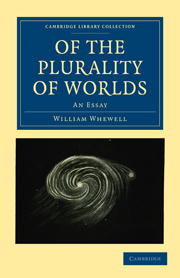Book contents
- Frontmatter
- Preface
- Contents
- CHAPTER I ASTRONOMICAL Discoveries
- CHAPTER II Astronomical Objection to Religion
- CHAPTER III The Answer from the Microscope
- CHAPTER IV Further Statement of the Difficulty
- CHAPTER V Geology
- CHAPTER VI The Argument from Geology
- CHAPTER VII The Nebulsæ
- CHAPTER VIII The Fixed Stars
- CHAPTER IX The Planets
- CHAPTER X Theory of the Solar System
- CHAPTER XI The Argument from Design
- CHAPTER XII The Unity of the World
- CHAPTER XIII The Future
CHAPTER IV - Further Statement of the Difficulty
Published online by Cambridge University Press: 05 October 2010
- Frontmatter
- Preface
- Contents
- CHAPTER I ASTRONOMICAL Discoveries
- CHAPTER II Astronomical Objection to Religion
- CHAPTER III The Answer from the Microscope
- CHAPTER IV Further Statement of the Difficulty
- CHAPTER V Geology
- CHAPTER VI The Argument from Geology
- CHAPTER VII The Nebulsæ
- CHAPTER VIII The Fixed Stars
- CHAPTER IX The Planets
- CHAPTER X Theory of the Solar System
- CHAPTER XI The Argument from Design
- CHAPTER XII The Unity of the World
- CHAPTER XIII The Future
Summary
We have attempted to shew that if the discoveries made by the Telescope should excite in any one's mind, difficulties respecting those doctrines of Natural Religion,—the adequacy of the Creator to the support and guardianship of all the animal life which may exist in the universe,—the discoveries of the Microscope may remove such difficulties: but we have remarked also, that the train of thought which leads men to dwell upon such difficulties does not seem to be common.
But what will be the train of thought to which we shall be led, if we suppose that there are, on other planets, and in other systems, not animals only, living things, which, however different from the animals of this earth, are yet in some way analogous to them, according to the difference of circumstances: but also creatures analogous to man;—intellectual creatures, living, we must suppose, under a moral law, responsible for transgression, the subjects of a Providential Government? If we suppose that, in the other planets of our solar systems, and of other systems, there are creatures of such a kind, and under such conditions as these, how far will the religious opinions which we had previously entertained be disturbed or modified? Will any new difficulty be introduced into our views of the government of the world by such a supposition?
I have spoken of man as an Intellectual Creature; meaning thereby that he has a Mind;—powers of thought, by which he can contemplate the relations and properties of things in a general and abstract form; and among other relations, moral relations, the distinction of right and wrong in his actions.
- Type
- Chapter
- Information
- Of the Plurality of WorldsAn Essay, pp. 30 - 51Publisher: Cambridge University PressPrint publication year: 2009First published in: 1853



